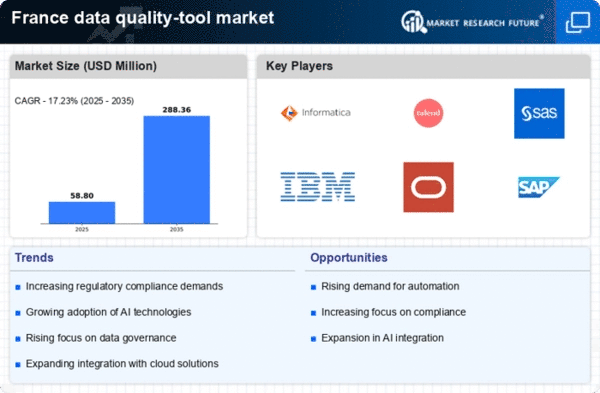Escalating Data Volume and Complexity
The exponential growth of data volume and complexity is a critical driver for the data quality-tool market in France. With organizations generating vast amounts of data from various sources, ensuring data quality has become increasingly challenging. This complexity necessitates advanced data quality tools capable of handling diverse data types and formats. According to recent estimates, the volume of data generated in France is expected to reach 2.5 zettabytes by 2025. Consequently, businesses are prioritizing investments in data quality solutions to enhance data accuracy and reliability. The data quality-tool market is thus positioned for growth as organizations seek to streamline their data management processes and improve decision-making capabilities.
Rising Regulatory Compliance Requirements
The data quality-tool market in France is experiencing a notable surge due to increasing regulatory compliance requirements. Organizations are compelled to adhere to stringent data protection laws, such as the General Data Protection Regulation (GDPR). This regulatory landscape necessitates the implementation of robust data quality tools to ensure data accuracy and integrity. As a result, businesses are investing significantly in data quality solutions to avoid hefty fines and reputational damage. The market is projected to grow at a CAGR of approximately 12% over the next five years, driven by the need for compliance and risk management. Consequently, the data quality-tool market is witnessing heightened demand for tools that facilitate data governance and compliance monitoring.
Increased Adoption of Cloud-Based Solutions
The shift towards cloud-based solutions is significantly influencing the data quality-tool market in France. Organizations are increasingly migrating their data management processes to the cloud, driven by the need for scalability, flexibility, and cost-effectiveness. This transition necessitates the integration of data quality tools that can operate seamlessly in cloud environments. As of November 2025, it is estimated that over 60% of businesses in France have adopted cloud-based data solutions, creating a substantial demand for data quality tools that ensure data integrity in these environments. The data quality-tool market is likely to benefit from this trend, as cloud-based solutions often require enhanced data quality measures to maintain compliance and operational efficiency.
Growing Emphasis on Data-Driven Decision Making
The increasing emphasis on data-driven decision making is propelling the data quality-tool market in France. Organizations are recognizing the value of accurate and reliable data in informing strategic decisions. As a result, there is a heightened demand for data quality tools that can provide insights into data accuracy and completeness. Recent surveys indicate that approximately 75% of French companies prioritize data quality as a key factor in their decision-making processes. This trend is likely to drive investments in data quality solutions, as businesses seek to leverage high-quality data for competitive advantage. The data quality-tool market is thus poised for growth, as organizations strive to enhance their data management capabilities.
Emergence of Advanced Analytics and Machine Learning
The emergence of advanced analytics and machine learning technologies is reshaping the data quality-tool market in France. Organizations are increasingly leveraging these technologies to enhance data quality processes and improve data accuracy. Machine learning algorithms can identify patterns and anomalies in data, enabling businesses to proactively address data quality issues. As of November 2025, it is estimated that around 40% of organizations in France are utilizing machine learning for data quality management. This trend indicates a growing recognition of the importance of integrating advanced analytics into data quality strategies. The data quality-tool market is likely to see significant growth as organizations adopt these innovative technologies to optimize their data quality efforts.
















